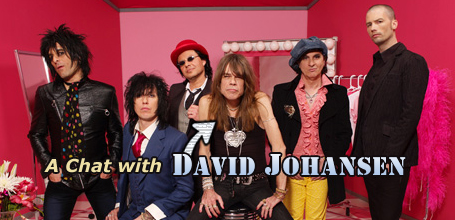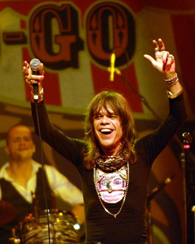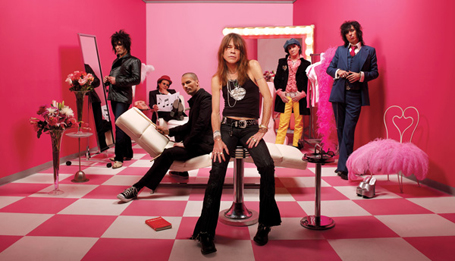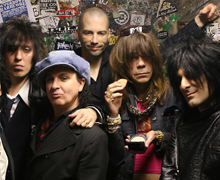 With the temperature dropping, it's time to find someone to keep you warm. Find your hookups with our online dating guide!
With the temperature dropping, it's time to find someone to keep you warm. Find your hookups with our online dating guide!

Interview date: 05/20/2008
Run date: 06/05/2008
Music Home / Entertainment Channel / Bullz-Eye Home
He earned his first fame as the frontman for the seminal punk band known as the New York Dolls, but even after the group disintegrated, David Johansen managed to keep his name amongst the general public. Sometimes it's been as a solo recording artist, other times it's been under the guise of the one and only Buster Poindexter ("Hot Hot Hot"), and once in awhile, when the mood has struck him, he's tried his hand at being a thespian. Now, however, Johansen has come full circle, returning to the band that first brought him stardom. Bullz-Eye spoke with the head Doll about the group's resurrection and subsequent decision to record a new album (One Day It Will Please Us to Remember Even This, released in 2006), what took him so long to commit to appear in the movie "Freejack," and how Buster Poindexter came to record a song from Disney's "Babes in Toyland."
David Johansen: Hello?
Bullz-Eye: Hi, may I speak to David?
DJ: Yes?
BE: Hey, this is Will Harris, with Bullz-Eye.com.
DJ: What's yer name?
BE: Will Harris.
DJ: Hiya, Will.
BE: How's it going?
DJ: Good, man. Thanks for calling.
BE: Hey, it's a pleasure to talk to you. I still haven't caught the Dolls since they reunited, but I did get to see you solo when you opened for Morrissey at one of his Apollo shows.
DJ: Oh, yeah, that was just before we did that, yeah.
BE: I guess he'd already made his invite to the Dolls to reunite for the Meltdown Festival by then.
DJ: No, I don't think he had. I don't remember, maybe he had. What month was it?
BE: It was May.
DJ: Maybe he had. I can't remember. But, I mean, I've known him for a long time, so I can't remember what's what.
BE: You definitely seemed reinvigorated when you were on stage that night, anyway.
DJ: I did? Oh, good. That's half the job.
BE: Exactly. So how long had you known Morrissey prior to him making that invitation to you?
 DJ: Well, when he was a kid, he used to write these letters to the editor of NME and stuff about us, and we knew about him. He wrote these letters championing the Dolls.
DJ: Well, when he was a kid, he used to write these letters to the editor of NME and stuff about us, and we knew about him. He wrote these letters championing the Dolls.
BE: When he pitched the idea of ya'll doing a reunion, what was your first reaction?
DJ: My first reaction was to not do it, because I was doing stuff, and I didn't really see the point in it. And then he convinced me…y'know, like, over the weekend or whatever. I think he called me on a Friday, and by Monday I'd decided that I would do it. I thought it would be fun.
BE: Prior to that, how much communications had you had with the other guys from the band?
DJ: Well, Syl I would talk every couple of months or something. We'd occasionally write a song together. Arthur I hadn't spoken to in several years.
BE: What did you think of "New York Doll," the film about Arthur's last days?
DJ: Well, I'm not an expert on it, because I only just saw a rough cut of it while they were making it, but it was really good, I thought, as far as those kinds of films go. It wasn't a cookie-cutter rock documentary. I think…y'know, it's great. I loved Arthur so much. He was such a great cat, and it was kind of cool that he had such a sympathetic guy to make a film about him.
BE: And, obviously, it's such a sad ending to the film because it's actually so uplifting prior to the revelation that he's passed away.
DJ: Y'know, they started that film before we decided to do that gig and all that stuff, so it wasn't even, like, "Oh, let's get in here and to this." It was already happening in one form or another. They didn't know how the film was going to turn out. The film was already in progress when we decided to play, so that's kind of a cool thing. It wasn't, like, capitalizing on the situation or anything.
BE: Based on what I've heard of the recent live stuff, it sounds like the current line-up is as tight as any in the history of the band.
DJ: Oh, yeah, we've got a really great band. I'm really happy with the band. We get on stage, and it's, like, exciting for me because it's different every night, and there's a lot of improvisation and fun stuff to be involved in. It's like we all go on this trip together, and it's really good.
BE: Given how tight you guys are now, do you ever kind of miss the rough and tumble days of the past?
DJ: I mean, I don't know that I miss it. It's so well documented, y'know? There's all this stuff, like the Gruen video and this and that, so you can see what that's like. Everything is different now, and I've always been a person who just feels like what's happening now is the best thing. I've always been like that. So I'm not really particularly nostalgic for any situation, as long as I'm in a good one.
BE: How successful do you personally feel One Day It Will Please Us to Remember Even This was as an album?
DJ: How successful?
BE: Yeah, I mean, do you think it can comfortably sit beside the albums from the original line-up?
DJ: Oh, gee, I don't know. That's not for me to say, y'know? I think, for me, it's a great album. I think it's genius. But what other people think is probably more important than what I think.

BE: Well, really, the only reason I ask is that Robyn Hitchcock did a reunion album a few years ago with his old band, The Soft Boys, and I loved it, but when you ask him about it, he starts talking about how maybe they were disturbing the dead by reinvoking the name for a new record.
DJ: Oh, no, I don't feel like that. I feel like it's a vital record. I'm happy about it. See, we got together to do one show at that Meltdown Festival, and then it became two shows. So we did two shows at some opera house or something in London, and it was nice, and we thought, "Well, that was it. We did it, and we had a lot of fun, and we really laughed a lot." And then we started getting calls to play at wherever these festivals were in the UK, and we figured, "Well, if we're having fun, let's take these things." Then we started doing those, and we were bivouacked with all these bands backstage and meeting everybody, and it was really nice, a lot of good camaraderie and rock 'n' roll. So we kept on accepting gigs, but it wasn't like…it hadn't really sunk in, like, "This is what we're gonna do now." And I think it took us about a year to realize, "Y'know, this is all we do now!" We'd started just playing all the time! So we just all thought, "Well, let's make a record, 'cause then we'll have some new stuff to play on stage. 'Cause, otherwise, we're just gonna be like Sha Na Na or something." So we made a record. But it's not like we got together and said, "Let's get back together, and let's do tours, and let's make a record!" And I think if I'd had that idea, or if somebody had proposed that idea to me originally, I would've thought, no, that's too much. It would've seemed overwhelming as far as the time and effort and all that kind of stuff is concerned. But I think when you fall into something and it just takes you, instead of you trying to fit a square peg into a round hole and make your plans come to fruition, it's almost better. To me, having experienced all kinds of things, to have no plan and just kind of hitch a ride with it, it's a lot more creative and relaxing than trying to have some kind of Maoist 5-year plan, y'know?
BE: Did you have any hesitation about keeping the Dolls' name going when it got down to just you and Syl? I mean, as opposed to calling yourselves The Johansen-Sylvain Experience or something.
DJ: Well, I didn't really have any hesitation. I mean, some people are, like, "Aw, man, that's not the Dolls," but there's people like that about anything. It doesn't matter what you do. You could find a cure for cancer, and they'd be, like, "The medicine's not pink! And it doesn't taste like grapes!" You know what I'm saying. There's always gonna be people like that, so you just don't listen to things like that. To me, I'm, like, you have to come to the conclusion in our culture that a brand is a big thing, as far as the way people think and relate to things. I mean, it's obvious it's a brand. It's got its own logo and t-shirt and everything. But one time during that summer when we'd gotten back together, we were out in L.A. and playing, and…you know Clem Burke?
BE: Yeah, of Blondie.
DJ: Yeah, yeah. So we played in L.A., and we played in Anaheim and San Diego or someplace, and Clem was there every night. And I was talking to him on, like, the third time he'd seen us, and I'm, like, "Clem, man, what are you doing? You stalking me, or what?" And he's, like, "Aw, man, the band's so great, I had to check out the band, I love the band so much." You know, after the Dolls, Syl and I had a band; we called it the David Johansen Group, and it was me and Syl and four or five other guys. So I said to Clem, "You could say this is the same thing." And he said to me, "No, man, this is the fucking Dolls, man! It's the fucking DOLLS!" And I was, like, "Okay, okay, whatever you say!" But, y'know, that was kind of an eye-opener for me. The way people perceive things...I really don't have any fucking idea, y'know? I just do what I do, and if people like it, that's cool. But the most important thing is to try to satisfy yourself when you try to do something. Time is finite, and when you're going to invest your time in something, it should be something that's giving you some satisfaction and some fun. Even if you're, like, a guy who tells jokes that nobody gets, I still think it's a noble thing to do, because a lot of times people eventually get them. A lot of times, things go over people's heads at the creative point, and it takes time for them to sink in. It seems to be a thing with the Dolls. I'll talk to people who'll say that they listened to One Day It Will Please Us to Remember Even This and thought, "Oh, well, it's a decent record, but it doesn't really do anything for me." Then they'd tell me a year later, "That's a fucking great record, man! That was the greatest record of the year!" And I'd ask, "Well, what happened?" "Oh, well, I started listening to it."
BE: (laughs) That's awesome.
DJ: It's so weird, where you'll play a record, you hear to it once, and…we all do this…you say, "Ah, this record's not doing anything for me," and you put it in the back of the stack. But some rainy day, you put it on again, and you start saying, "This is actually a pretty good record." And in a month, you're playing it every day. So who the hell knows about these things? There's so much baggage attached to things. It's almost like earwax.
BE: You know, speaking of rainy-day albums, you actually contributed to one of my favorite rainy-day albums: Stay Awake: Various Interpretations of Music from Vintage Disney Films. You did that great version of "Castle in Spain," but it was ages ago, I don't know if you even remember doing it!
DJ: You know, I do remember doing it, and it's funny because I just had this déjà vu about it. Hal (Willner) had done this performance of that album at St. Anne's, and he asked me to sing that song, so I had to, like, get him to send me the song, because I had never even heard it! (laughs) When we made that record, we had played Thursday, Friday and Saturday night as the Buster Band, and we had probably done two shows a night, and we cut that thing on, like, Sunday morning. I mean, I don't know if was actually morning, but it was early. And we all kind of staggered in, hung over. We had a nice arrangement that Brian Koonin did, and I remember singing it, and I had no voice. My voice wouldn't have come back until, like, 10 o'clock at night. So after it was done, I said, "Well, I'll come back in next week or something, when you've got an hour, and I'll re-do the vocal." But he was, like, "Oh, no, man, that's the vocal! I love that vocal!" And I was, like, "Oh, man," y'know? So I didn't even…I forgot about it. I didn't even want to hear it. So I already had this memory two weeks ago when I did that show.
(On recording "Castle in Spain") "We cut that thing on, like, Sunday morning. I mean, I don't know if was actually morning, but it was early. And we all kind of staggered in, hung over, and I remember singing it, and I had no voice. But (producer Hal Willner) was, like, "Oh, no, man, that's the vocal! I love that vocal!'"
BE: Well, I want to keep you on target, but I just wanted to close by saying that one of our other editors is a huge fan of "Freejack."
DJ: (offers up something between a laugh and a cough) Uh...really?
BE: (laughs) Yeah. I'm not exactly sure on what level he's a huge fan of it, but he does actually have it on DVD.
DJ: Wow.
BE: Does anything particularly stand out about that experience?
 DJ: Well, I remember that I was working a lot, and the guy that was making that film, he was a trumpet player from New Zealand, and he had made this New Zealand movie. This guy had, like, lived with the Maoris or whatever. Geoff Murphy, a very cool cat. So, anyway, he's a musician, and he asked me to be in the film, and I was, like, "Well, I dunno, Geoff, 'cause I'm doing this and I'm doing that, and I'm gonna have a nervous breakdown if I do your film." But he sent me the script, and I had the script sitting, like, on the table, and I kept getting messages from him, saying, "Oh, we're gonna start doing this film, you've gotta make up your mind, I really need you, I really want you to be in this film…" And I kept looking at this script sitting there…looking at it, but not picking it up! I kept going, "Aw, man, I don't want to read a script!" 'Cause when you're reading a script, you're reading it on so many levels…at least, for me…that it's a whole lot of time and energy. So, finally, I picked it up and started reading it…and then I got shot on, like, page 17 or something! And I thought, "Oh, man, why didn't they tell me? Of course I can do this!" If I'm shot on page 17, I'm not gonna be sitting there for four months, waiting for them to get the science-fiction truck to work. (laughs) As I recall…and I haven't seen it since they made it… they had some really goofy equipment in that movie.
DJ: Well, I remember that I was working a lot, and the guy that was making that film, he was a trumpet player from New Zealand, and he had made this New Zealand movie. This guy had, like, lived with the Maoris or whatever. Geoff Murphy, a very cool cat. So, anyway, he's a musician, and he asked me to be in the film, and I was, like, "Well, I dunno, Geoff, 'cause I'm doing this and I'm doing that, and I'm gonna have a nervous breakdown if I do your film." But he sent me the script, and I had the script sitting, like, on the table, and I kept getting messages from him, saying, "Oh, we're gonna start doing this film, you've gotta make up your mind, I really need you, I really want you to be in this film…" And I kept looking at this script sitting there…looking at it, but not picking it up! I kept going, "Aw, man, I don't want to read a script!" 'Cause when you're reading a script, you're reading it on so many levels…at least, for me…that it's a whole lot of time and energy. So, finally, I picked it up and started reading it…and then I got shot on, like, page 17 or something! And I thought, "Oh, man, why didn't they tell me? Of course I can do this!" If I'm shot on page 17, I'm not gonna be sitting there for four months, waiting for them to get the science-fiction truck to work. (laughs) As I recall…and I haven't seen it since they made it… they had some really goofy equipment in that movie.
BE: Yeah, it was one of those films that takes place in the far and distant future that looks suspiciously like the present.
DJ: Or like they thought the future was gonna look in the 1930s!
BE: Exactly. Well, I'll keep you on track, but it's been a pleasure talking to you.
DJ: Okay, man. Thank you!
You can follow us on Twitter and Facebook for content updates. Also, sign up for our email list for weekly updates and check us out on Google+ as well.










